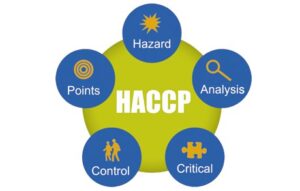 Hazard Analysis and Critical Control Points or HACCP (/ˈhæsʌp/) is a systematic preventive approach to food safety from biological, chemical, and physical hazards in production processes that can cause the finished product to be unsafe, and designs measurements to reduce these risks to a safe level. In this manner, HACCP is referred to as the prevention of hazards rather than finished product inspection. The HACCP system can be used at all stages of a food chain, from food production and preparation processes including packaging, distribution, etc. The Food and Drug Administration (FDA) and the United States Department of Agriculture (USDA) say that their mandatory HACCP programs for juice and meat are an effective approach to food safety and protecting public health. Meat HACCP systems are regulated by the USDA, while seafood and juice are regulated by the FDA. The use of HACCP is currently voluntary in other food industries.
Hazard Analysis and Critical Control Points or HACCP (/ˈhæsʌp/) is a systematic preventive approach to food safety from biological, chemical, and physical hazards in production processes that can cause the finished product to be unsafe, and designs measurements to reduce these risks to a safe level. In this manner, HACCP is referred to as the prevention of hazards rather than finished product inspection. The HACCP system can be used at all stages of a food chain, from food production and preparation processes including packaging, distribution, etc. The Food and Drug Administration (FDA) and the United States Department of Agriculture (USDA) say that their mandatory HACCP programs for juice and meat are an effective approach to food safety and protecting public health. Meat HACCP systems are regulated by the USDA, while seafood and juice are regulated by the FDA. The use of HACCP is currently voluntary in other food industries.
Certificate Programs by Industry:
-
- Production
- Processors
- Manufacturers
- Retail
- Restaurants
- Fresh Cut Produce
- Bottle Water Processors
- Seafood
HACCP Training courses for:
- HACCP Team Leader
- HACCP Team Members
- Quality Control and Assurance Personnel
- Production Managers and Staff
- Food Safety Trainer or Auditor
- Food Safety Inspector
- Food Managers
- Front Line Food Handlers
